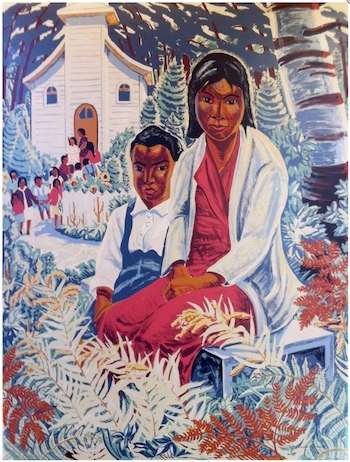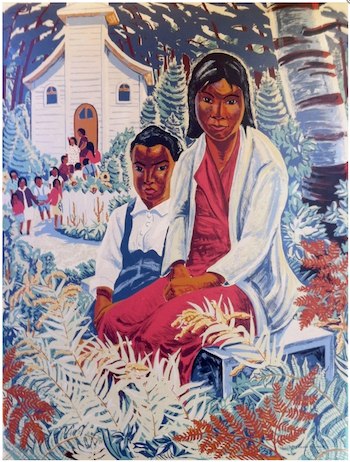
Residential school history – explored through art
“Indian Children” by Yvonne McKague Housser, 1944.
Image courtesy, Sampson-Matthews Silkscreen Prints
This 1944 painting touched me immensely last December when I first saw it. I noticed it on the wall of Christine Caroline’s Estate Sale Store in Vancouver. I was drawn to the painting style first, but then noticed what it depicted. I went from being moved by the painting style, associated with the Group of Seven, to being moved by the sadness in the eyes of the woman and child in the foreground.
In this picture, Housser has captured the feeling of defeat that I expect many First Nations people in Canada felt as they were forced to give up their Indigenous lifestyle and to send their children to Indian day schools and Indian Residential Schools where they were not permitted to use their language or practice their customs – and were separated from their families.
I bought the silkscreen reproduction but found it hard to look at on a daily basis. I always got a bad feeling when I looked at it and remembered all the trauma associated with Indian Residential Schools. My recent work with the McLeod Lake Indian Band has brought me into contact with horrific stories from survivors, so a visual reminder was too much for me. For now, the picture is behind my dresser waiting for the right time and space for daily viewing. I am writing about this during BC Reconciliation Week as the picture and its impact on me have been on my mind.
I look forward to visiting UBC’s Belkin Art Gallery exhibit entitled: “Witnesses: Art and Canada’s Indian Residential Schools,” which runs until December, to see how contemporary artists are dealign with the topic. So often art, and artists, convey experiences so much more powerfully than historical facts by triggering emotions in the viewer/audience.
Here is to reconciliation in all its pathways and forms.

Jillan Ridington -
Well said, Amber – The woman has unfathomable sadness in her eyes. Listening to the people from McLeod Lake tell their stories, and realizing how much of their culture they lost compared to their Dane-zaa cousins, is devastating.